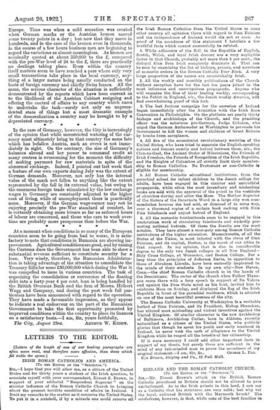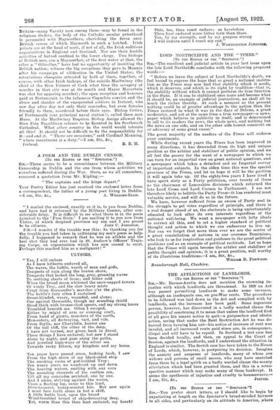IRELAND AND THE ROMAN CATHOLIC CHURCH. (To THE EDITOR OF
THE " SPECTATOR."1
Sta,—Mr. Ernest Brown's attack on the British Roman Catholic priesthood in Britain should not be allowed to pass unchallenged. As to the Irish priests in this land, I can say as a Catholic that his strictures are very mild; but why tar the loyal, cultured British with the Maynooth brush? The misfortune, however, is that, while sons of the best families in
Britain—many Varsity men among them—may be found in the religions Orders, the body of the Catholic secular priesthood is permeated with Maynoothers, cherishing the fierce anti- British venom of which Maynooth is such a hot-bed. Irish priests are at the head of most, if not of all, the Irish seditious organizations in England and Scotland. Nor are their hostile activities of hatred confined to the lower clergy. Two bishops of British sees, one a Maynoother, of the first water at that, the other a " Gibraltee," have lost no opportunity of insulting the British nation; witness the big receptions they gave to Mannix after his campaign of vilification in the United States; the ostentatious obsequies attended by both of them, together, of course, with other Irish bishops, of the suicide MacSwiney (the Chief of the Sinn Feiners of Cork what time the savagery of murder in that city was at its zenith and Mayor Macurtain was shot for opposing murder); the open reception and honours paid at Portsmouth to the infamous Capuchin convict and the abuse and slander of the exasperated soldiers in Ireland, who saw day after day not only their comrades, but even females friendly to them, murdered before their eyes. Bishop Cotter, of Portsmouth (our principal naval station!), called these men Huns. At the MacSwiney Requiem Bishop Amigo allowed tha Sinn Fein Republican colours to be flaunted in his Southwark Cathedral. What other country in the world would tolerate all this? It should not be difficult to fix the responsibility for it—and end it. "There are occasions," said Cardinal Manning, "where resentment is a duty."—I am, Sir, &c.,



































 Previous page
Previous page